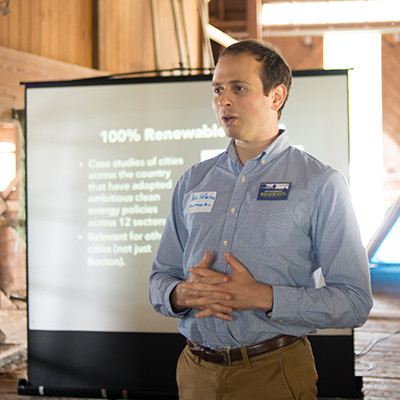
Ben Hellerstein
Former State Director, Environment Massachusetts
As we work to build a cleaner transportation system, what can we learn from my grandmother's childhood in the 1930s?
Former State Director, Environment Massachusetts
My 93-year-old grandmother lives on her own in the suburbs of New York. Her kids and grandkids are scattered across the continent, in Manhattan, Boston, and Philadelphia, and as far afield as Toronto and Los Angeles.
To keep the family connected during the pandemic, my mother started an email chain where each week a different relative asks Grandma a question about her life.
Recently, it was my turn to ask a question. Transportation was on my mind, probably because I had just read the section of Governor Charlie Baker’s proposed 2030 climate action plan dealing with greenhouse gas emissions from the transportation sector. So I asked Grandma: “How did you get around as a kid?”
Grandma replied a few hours later. The first memory she shared was from kindergarten, when she walked to school with an older classmate who lived nearby. This was in the 1930s, in Syracuse, New York. She also remembered walking to nearby Thornden Park with her mother and sister to see the rose garden.
Later, my grandmother and her family moved to New York City, and then to New Rochelle, a suburb. In the city she learned to ride the subway. In the suburbs, her transportation plans revolved around — in her words — “reliable bus lines and boyfriends with bicycles or, if we were lucky, their parents’ cars.” Her family had owned a car for a few years in Syracuse, a circa-1935 Chevrolet. But they sold it before moving downstate.
Grandma’s response opened a window onto her early years, and it also illustrated how our transportation options have changed during her lifetime.
Today, how many students can walk from their home to their elementary school? How many parents feel safe letting their kids bike around the neighborhood? How many children can visit their friends or get to after-school activities on their own, instead of relying on family members to shuttle them from one location to the next?
In recent decades, we’ve designed our communities around the assumption that everyone will drive everywhere, with disastrous results. The transportation sector is now the largest source of global warming pollution in Massachusetts, responsible for more than 40 percent of our emissions.
Pollution from tailpipes damages our health, contributing to asthma, heart attack, and other diseases. We waste hours and hours in our cars, commuting to work or driving our kids between school and other activities. Americans struggle to get enough physical exercise, a problem that could be ameliorated if we spent more time walking or biking instead of sitting in traffic.
While we may regret the passing of a world where “boyfriends with bicycles” were a dependable mode of transportation, Grandma’s email makes me hopeful. If we once lived in communities where it was as easy to walk, bike, or take public transit as it was to drive, surely we can do so again. Today we have the benefit of decades of experience in what works and what doesn’t, and access to technologies that people couldn’t have imagined back then.
Here are three suggestions, inspired by Grandma:
First, let’s invest in the infrastructure that makes our communities more walkable and bikeable, like sidewalks, crosswalks, and protected bike lanes. Let’s also take a close look at the way we design the portion of our streets used by cars, to reduce the likelihood of speeding and the too-often-fatal accidents that result for pedestrians and cyclists.
Second, let’s improve our public transit systems. Some upgrades will require significant investment, like expanding commuter rail service. Other actions — like setting aside bus-only lanes on key routes — require little more than a bucket of paint.
And finally, when people drive, let’s make sure they are driving a clean electric vehicle, powered by renewable energy.
When we accomplish this, we’ll make our communities healthier and safer for everyone, from kindergarteners to grandmothers.
Photo: arkivkopia.se-digmus-tek-TEKA0124656, archive.org
Former State Director, Environment Massachusetts
